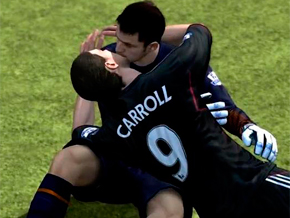No. This headline is not true. It could be, but it isn't. One search master's degree defended at the Faculty of Physical Education at Unicamp, entitled "Affected utterances: possible relationships between homophobia and sport", mentions that at the end of the 1970s gay fans from Rio Grande do Sul had already put their faces to shame and dared their passion for football, creating the "Organized Coligay Fans"!
Rodrigo Braga do Couto Rosa, author of the study, says that in the same period "Fla-gay" also emerged, an organized fan base for Rio's "mengão". She was even banned from entering Maracanã by the club's president at the time.
Today, as in those times of military dictatorship, there is no shortage of gay fans. In the last "LGBT pride" parade in São Paulo, for example, the Datafolha research revealed that among those attending the Parade, 35% declared themselves Corinthians fans, 22% were São Paulo fans, 11% Palmeiras fans and 5% Santos fans.
But why do we retreat in relation to this type of visibility on football fields in Brazil abroad? Or does anyone today know any gay (or lesbian, transvestite, bisexual...) football fans who have been going organizedly, complete with the team's flag and shirt, to cheer on the football fields? If you know, share it. It's a rarity!
On the field it's no different. Wise is Richarlyson who stated what everyone already knew: "no player will come out as gay." In this, soap opera heartthrobs are in the same situation as football players, after all, they are instructed never to be frank about their desires if they are not heterosexual. Aguinaldo Silva himself said: "I think it's fair that he doesn't come out because every heartthrob sells the illusion of virility. If he comes out as homosexual, it breaks the spell, it marks the person."
That is the problem. People still confuse, on the field and on TV, virility with the standard masculinity of the global heartthrob or the so-called heterosexual football player. And this is, as Aguinaldo said, pure illusion. I know a lot of virile queers who are still cute, quack-quack, closed-off, feminine. And, many know intimate stories of players who like other players.
But, of course, Fantástico wouldn't show two queers kissing if they were part of a football fan base. So, in addition to the fact that there are no longer organized gay fans in stadiums (which does not mean that there are no gays in the stands) it is necessary to understand what the kiss on the small screen on Sunday night is for.
Fantástico's painting is an ode to heterosexual love, and it makes sense to be repeated every Sunday because, naturally, heterosexuality and kissing have nothing to do with love. If that were the case, straight people would only kiss those they love (the same statement applies to homosexuality). Therefore, it is necessary to reiterate at all times that men and women should kiss in public, and even better if there are children involved, which is what many images of the painting presented by the charming Tadeu Schmidt reveal every Sunday.
Boys need to learn from an early age that kissing girls and playing football is very good, girls need to learn from an early age that going to the field and kissing your husband, in addition to supporting the same team as his, is beautiful. If all this were natural, there would be no need for the "kiss camera", people would do the same without being motivated.
But, what if, due to an editing error in the painting and a miraculous act of courage by half a dozen openly gay and football fans, a gay couple actually appeared in Fantástico's "kiss cam"? Would they leave the stadium alive? Would Tadeu apologize saying they had a technical problem? Would the so-called non-gay organized fans react with hatred on virtual networks?
Until that happens, everything continues as it has been. The week begins with yet another respectful defense of romantic love, mixed with football to guarantee the illusion of virility, without any reference to scenes like the one Rodrigo described in his study and which I reproduce below.
"It's already evening. I have just returned from Moisés Lucarelli Stadium, home of Associação Atlética Ponte Preta, a team that a few minutes ago lost the game valid for the thirteenth round of the Campeonato Paulista of the 1 A2010 series. They lost to São Paulo Futebol Clube , 2 to 0. I went to the game because I wanted to have the experience of sharing the football stadium with Richarlyson and thousands of other people, including players, show workers and fans.
But especially, I wanted to be with Richarlyson. He wanted to see Torcida Independente shout the names of São Paulo's members and ignore that of the supposed gay who embarrasses them. Although I couldn't make out absolutely everything the crowd was chanting, I'm sure I didn't hear his name. I remember shouting for Rogério Ceni, Dagoberto, Marcelinho Paraíba[…] but no Richarlyson. I also went to see how fans behaved against an opponent they chose to be gay and what I saw exceeded my expectations. In addition to the terms fagot and bicha – with their respective developments derived from the language mechanisms we call augmentatives and diminutives – being the most frequently used, after son-of-a-bitch, nothing moved Ponte fans more than trying to hit Richarlyson with words.
I mean, even though all São Paulo players were shot for shouting "Bambi!", a charge reserved for those who were contaminated, for playing at that club and for sharing the field, dressing room, payroll with a "suspect", the The preferred target, without a doubt, was Richarlyson. Because of his alleged bisexuality, many fans stood up, grabbed their genitals and offered them to the player. There were many fans who suggested that he do what they said was what he liked most: give ass! Nor were there a few children, boys in their entirety, who made an effort to disqualify him, choosing to add a "faggot" to the classic "son-of-a-bitch", encouraged and encouraged by their fathers and mothers who shouted the same phrases. In my eyes and ears, the wonders of the game succumbed to the horror of its surroundings." (RODRIGO ROSA, 2010)
**Tiago Duque is a sociologist and has experience as an educator in different areas, from teacher training to street social education. Milita no Identidade – Fight for Sexual Diversity Group. He likes to think and act with those who want to do something new, in search of another possible world.



